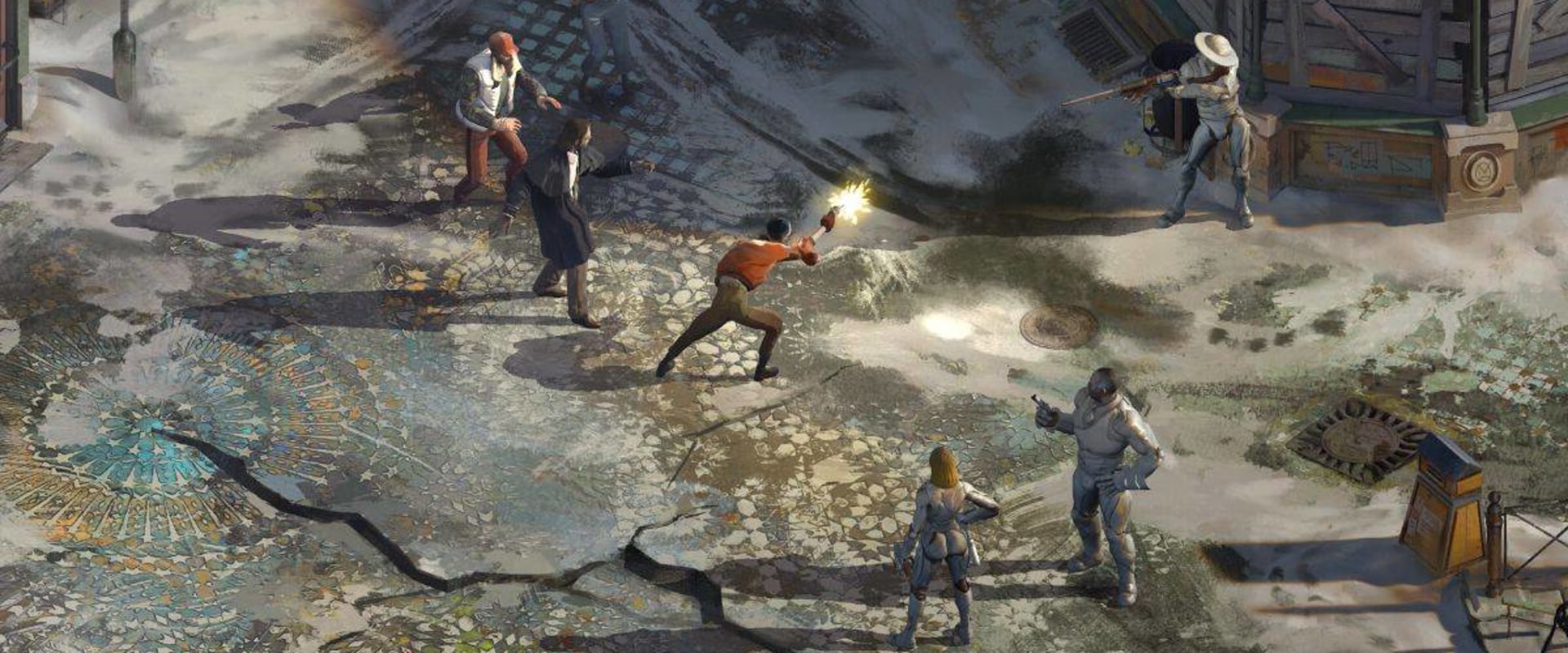Are you a fan of classic video games? Do you love to explore new and exciting genres? If so, role-playing games are the perfect choice for you. Role-playing games, or RPGs, are a genre of video games that have been around since the 1980s and still remain popular today. From classic 8-bit titles to modern 3D open-world adventures, there's something for everyone. In this article, we'll take an in-depth look at role-playing games, what makes them unique, and some of the classic titles that you should check out. Role-playing games (RPGs) have been around since the dawn of gaming, and they’re still one of the most popular genres today.
From classic tabletop RPGs to modern video game RPGs, these games can be immersive and engaging experiences. Learn all about role-playing games and how to find the right one for you. At their core, role-playing games involve characters that players can develop and control as they progress through a story or quest. Players are able to customize their characters by assigning attributes, skills, and abilities. Depending on the game, players may also choose a class, race, or other characteristics to further define their character.
As players progress through the game, they will gain experience points that can be used to level up their characters and acquire new skills or abilities. Role-playing games have their roots in tabletop gaming systems such as Dungeons & Dragons. These early RPGs featured dice-based combat systems and character sheets that players used to track their characters’ progress. With the advent of video game consoles, role-playing games began to transition from tabletop gaming to digital gaming. Early video game RPGs were closely modeled after tabletop RPGs, but with the addition of graphics and sound.
Modern RPGs are often more complex, with detailed storylines and dynamic environments. Examples of classic RPGs include Final Fantasy, Dragon Quest, Ultima, and The Elder Scrolls series. Modern role-playing games often feature open-world environments that players can explore at their own pace. These games also offer more customization options for characters, including gender selection, clothing choices, facial features, and more. Players can also specialize their characters in certain skills or abilities that can be used during combat or exploration.
For example, a character may specialize in magic spells or ranged weapons depending on the player’s preference. One of the key elements of role-playing games is storytelling. As players progress through the game, they will uncover pieces of a larger story that may involve multiple characters and NPCs (non-player characters). Some RPGs also feature branching storylines, allowing players to make choices that affect the outcome of the game. This type of storytelling can be incredibly immersive and engaging for players, allowing them to create their own unique stories within the game. There are many different platforms on which role-playing games are available today.
Console games such as the Final Fantasy series are typically released as physical copies for a specific platform (e.g., PlayStation 4). PC games are generally available as digital downloads from online stores such as Steam or GOG. Mobile games are usually released as apps for iOS or Android devices. When choosing a role-playing game, it’s important to consider your own preferences and play style. Some games are geared towards casual players while others may be more complex and require more time investment.
It’s also important to consider the platform on which you’ll be playing the game. Console versions of RPGs tend to have higher production values but may require additional hardware or peripherals (e.g., controllers). Mobile games may offer more flexibility but may also be limited in terms of content. Role-playing games can be incredibly rewarding experiences for players who enjoy stories and character customization. With so many different types of games available on so many different platforms, there’s sure to be an RPG out there for everyone.
Leveling Up
Leveling up is one of the core concepts of role-playing games (RPGs).As players progress through the game, their characters become stronger and gain new abilities. This process is known as character progression or leveling up. Players can choose how to level up their characters, focusing on certain attributes or abilities to improve their characters' performance. In most RPGs, characters are rewarded with experience points (XP) for completing tasks or defeating enemies. When enough XP is acquired, the character can level up.
Leveling up usually grants the character additional health points, mana points, and stat points which can be used to increase the character's strength, agility, intelligence, and other attributes. Leveling up also unlocks new abilities and skills which can be used in combat or other activities. Players can customize their characters by choosing which skills and abilities to focus on. The rewards for leveling up can vary depending on the game. In some games, players may receive items that improve their character's stats or equipment which can give them an edge in combat. Examples of how characters change as they progress through a game include gaining access to new spells or abilities, increased stats, and improved equipment.
For example, in some RPGs, characters start out as mere peasants but can eventually become powerful wizards or warriors. As characters level up, they become more powerful and have access to more powerful items and spells.
Storytelling
Role-playing games (RPGs) offer a unique form of storytelling. Unlike other types of video games, RPGs allow players to create their own stories through interactive dialogue and branching storylines. This creates an immersive and engaging experience that can be both captivating and rewarding.Storytelling in RPGs is a powerful tool that enables players to explore their own narrative and make meaningful choices that shape the outcome of the game. Through these choices, players can craft their own stories and create unique experiences for themselves. Additionally, RPGs can provide an opportunity for players to explore different perspectives and understand different points of view in the game. Some of the ways that stories can be told through RPGs include branching storylines, interactive dialogue, and player decisions that have consequences.
For instance, a branching storyline allows players to make choices that will affect the plot and outcome of the game. Interactive dialogue allows players to converse with characters in the game and make decisions based on their conversations. Finally, player decisions can have long-term consequences in the game, as they can determine how NPCs react to the player's actions or influence the story's overall outcome. Examples of stories that can be told through RPGs include fantasy adventures, science fiction stories, and even slice-of-life tales.
For instance, a fantasy RPG might involve a quest to save the world from an evil wizard or dragon. In a science fiction RPG, players might explore a distant galaxy or search for a mysterious artifact that could unlock the secrets of the universe. And in a slice-of-life RPG, players might get to experience everyday life from a different perspective and make decisions that will shape the course of their journey.
Platforms & Features
Role-playing games (RPGs) are available on a variety of platforms, including consoles, PCs, and mobile devices. Each platform offers its own unique features, so it's important to consider which platform best suits your preferences.When selecting an RPG, look for features such as graphics, audio, difficulty levels, and multiplayer options. Quality graphics and sound can help to create a more immersive experience. Difficulty levels can help you choose a game that is challenging without being too difficult or too easy. Multiplayer options can allow you to play with or against other players online.
For example, the popular RPG Final Fantasy VII was released in 1997 for the original PlayStation console and later for PCs and mobile devices. The original game had 8-bit graphics and limited audio compared to the modern remakes, which feature improved graphics and full voice acting. The remakes also feature various difficulty levels and other improvements, including a classic turn-based battle system. Another popular RPG is The Witcher 3: Wild Hunt, which was originally released for the Xbox One and PlayStation 4 consoles.
This game features high-quality graphics and voice acting, as well as a variety of difficulty levels and an open-world exploration system. There are also multiplayer components such as Gwent tournaments that allow players to compete against each other. These are just two examples of RPGs that are available on different platforms. When selecting an RPG, consider the features available on the platform you plan to use and look for games that have the features you need. You can also consult reviews to see what other players think of the game.
Character Creation
Character creation is an integral part of role-playing games (RPGs) and is often seen as the first step in the game.Character creation involves creating a unique character that will be controlled by the player throughout the game. This process is often done through customizing a set of stats, traits, and other attributes that define the character’s capabilities. The type of character created is entirely up to the player, as they can choose from a variety of races, classes, and other choices to create a unique character. Some players prefer to create a character that is similar to themselves, while others enjoy creating characters that are completely different from them.
It is also possible to customize the appearance of the character with various options such as hair color and facial features. Character creation in RPGs can be a very rewarding experience for some players. It allows them to take control of the character’s destiny and gives them a sense of ownership over their character. Creating a unique character also helps to add an extra layer of immersion to the game, as players can become more attached to their characters and their stories.
When creating a character, it is important to consider how it will interact with the other characters in the game. Players should take into account their character’s strengths and weaknesses and how they will fit into the overall story. It is also important to consider the type of equipment that the character will need in order to succeed in the game. Examples of character creation screens can be found in many popular RPGs such as The Elder Scrolls V: Skyrim, Fallout 4, and Dragon Age: Inquisition.
These screens allow players to customize their characters in a variety of ways, such as assigning stats and selecting special abilities or perks. By customizing their characters, players can ensure that they have the best chance of success in the game.
Skills & Combat
Skills & Combat Role-playing games often feature a variety of skills and abilities that players can use to their advantage. These can range from offensive combat skills to more esoteric magical powers. Players can customize their characters by assigning points to each of these skills, allowing them to specialize in certain areas or become well-rounded warriors.The way in which these skills are used in combat varies from game to game. In some games, the player has direct control over the characters, allowing them to use their skills as they wish. Other games, however, may use a more automated combat system, where the characters will automatically perform certain actions based on their stats and the player’s input. Players can also use various strategies to gain an edge in combat.
The most common strategy is to target the enemy’s weaknesses, using skills or abilities that they are not prepared for. For example, a magic user may have a hard time defending against physical attacks, while a physical fighter may not be able to defend against magical attacks. By exploiting these weaknesses, players can gain an advantage and defeat their enemies more quickly. To illustrate these concepts, let’s look at an example of a combat sequence. Suppose a player is facing a group of enemies and has chosen to fight using physical attacks.
The player will need to use their agility and strength stats to dodge and counterattack the enemies’ blows. They will also need to use their knowledge of the enemy’s weaknesses in order to land critical hits. If the player successfully navigates the combat and defeats their enemies, they will be rewarded with experience points, loot, or other rewards. Role-playing games (RPGs) offer a variety of experiences that can be both immersive and engaging. Character creation, leveling up, skills and combat, and storytelling are all key elements of an RPG, and the platforms and features available for these games continue to improve over time.
With so many options available, there's likely an RPG that suits everyone's interests. To find the right one, it's important to explore the different types of RPGs and look for more information about them. Players can also share their favorite games and experiences with others in the comments section. Overall, RPGs remain popular due to the unique experiences they offer. From classic tabletop games to modern video game RPGs, there's something for everyone.
With a little exploration, anyone can find an RPG that suits their interests.













